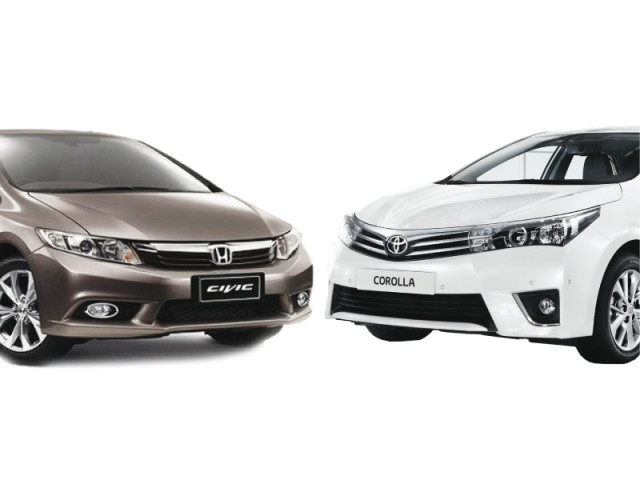Buyer preference: 1.8L engines may win a race but 1.3L ones remain ahead
Toyota and Honda compete over top-of-the-line vehicle.

When one ventures on deciding which car to buy, the equation would involve numerous variables. The price is most likely to be the biggest factor followed by engine performance, fuel efficiency, shape and design, company’s reputation among a host of other determinants.
When it comes to locally-assembled vehicles, Pakistanis don’t get a lot of choice. If one was to discount imported cars, it would boil down to a handful of players and their limited variants.
Here, we investigate the latest Honda Civic and the recently-launched Toyota Corolla and the factors that may or may not tilt the choice.
Most of us would prefer driving a powerful 1.8L – it gives the driver more power on the road and features are usually grander – but price and fuel efficiency force buyers to re-think.
Hence, Pakistan’s most popular sedans are not 1.8-litre ones.
Analysts and local carmakers say that the number of Pakistanis who prefer engine performance and power over fuel efficiency are still in a minority — the main reason why companies sell 1.3L, 1.5L and 1.6L engine cars.
Despite the popularity of smaller engine capacities, both Honda and Toyota produce 1.8L cars in Pakistan. The companies want to keep their top-of-the-line products to show off their technological muscle.
Pak Suzuki – the largest carmaker with over 50% market share – also produces a popular 1.3L Swift, but a hatchback is not Honda City and Toyota Corolla’s competitor.
In July 2014, Indus Motor launched the first variant of Toyota Corolla in the 1.8L category, marking its response to Honda Civic that released its latest model in 2012.
There is no need to mention that Indus Motor Company gives little room to Honda — not even in the 1.8L engine category where the pie is the smallest.
The company could have launched the series with its most popular 1.3L Corolla variant, but it opted otherwise.
“We wanted to introduce the new Corolla series with the more exciting model first,” Indus Motor spokesperson said.
Probably, Indus learnt its lesson. It launched the 1.8L variant in its previous Corolla series but concentrated more on the 1.6L variant after witnessing high demand in that category. Consequently, the company lost its 1.8L customers, who switched to Honda Civic as it was the only car in that category.
“The makers of Corolla wanted to grab some of the market share of Civic in the 1.8L category. This time, it seems, Indus Motor wants to remain in the 1.8L category,” Global Research analyst Imran Ahmed Patel told The Express Tribune.
Analysts say that there will be healthy competition between the two companies, which is perhaps the reason why Honda has recently started placing Civic advertisements on television channels to tempt customers.
With a 21% market share, Indus Motor is the second biggest carmaker in Pakistan, behind Pak Suzuki but ahead of Honda Atlas Cars. In 2013, Toyota Corolla variants held a strong 60% market share in their segment, down from 79% in fiscal year 2012, according to Indus Motor Company’s latest annual report of 2013.
Commenting on whether Pakistani carmakers are more comfortable in launching 1.8L cars, spokesperson of Honda Atlas Cars said the largest market segment in the country is not 1.8L, implying that this particular engine capacity is not the core focus of carmakers. For Honda, its spokesperson added, 1.8L Civic is the benchmark top-of-the-line car that displays the company’s technology and style.
1.3L sedans remain ahead
Both Indus Motor and Honda Atlas agree that the demand of 1.8L cars is there to stay but the category which both companies rely more on is the 1.3L engine vehicles.
When asked which engine category has been witnessing more growth among its 1.3L, 1.5L or 1.8L variants, spokesperson of Honda Atlas Cars said the 1.3L category has been showing steady growth. This is despite the fact that Honda Atlas is satisfied with the market response that it received on the launch of 1.5L City Aspire variant, which it launched in April 2013.
“Although the demand for 1.8L cars is on a rise, the 1.3L is still the preferred variant in Corolla for many segments of the society primarily due to fuel efficiency,” an official at a local carmaker said.
Analysts agree with industry officials that most of the Pakistani customers keep in mind fuel efficiency while making a decision of selecting car engine category.
Toyota makes 1.3L Corolla variant for a very few countries including Pakistan. The popularity of the 1.3L Corolla variant in Pakistan in the presence of 1.6L and 1.8L variants substantiates the point that a large majority of Pakistanis are ready to compromise on some specifications for fuel efficiency in 1.3L engines, said Patel.
The writer is a staff correspondent
Published in The Express Tribune, September 15th, 2014.
Like Business on Facebook, follow @TribuneBiz on Twitter to stay informed and join in the conversation.



















COMMENTS
Comments are moderated and generally will be posted if they are on-topic and not abusive.
For more information, please see our Comments FAQ